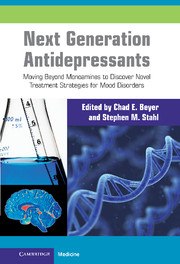 Next Generation Antidepressants
Next Generation Antidepressants Published online by Cambridge University Press: 19 October 2021
Monoamine-based strategies and targets have provided a useful variety of therapeutic agents with beneficial activity in the treatment of depression. However, this approach has some limitations, including a delayed onset of efficacy and treatment resistance. As a result, there is significant interest in non-monoamine targets and their potential as antidepressants. This search for new treatment modalities has been aided by better understanding of the neurochemical pathways involved in mood. This chapter will review medicinal chemistry advances in a selection of non-monoamine targets of current interest in the field.
To save this book to your Kindle, first ensure [email protected] is added to your Approved Personal Document E-mail List under your Personal Document Settings on the Manage Your Content and Devices page of your Amazon account. Then enter the ‘name’ part of your Kindle email address below. Find out more about saving to your Kindle.
Note you can select to save to either the @free.kindle.com or @kindle.com variations. ‘@free.kindle.com’ emails are free but can only be saved to your device when it is connected to wi-fi. ‘@kindle.com’ emails can be delivered even when you are not connected to wi-fi, but note that service fees apply.
Find out more about the Kindle Personal Document Service.
To save content items to your account, please confirm that you agree to abide by our usage policies. If this is the first time you use this feature, you will be asked to authorise Cambridge Core to connect with your account. Find out more about saving content to Dropbox.
To save content items to your account, please confirm that you agree to abide by our usage policies. If this is the first time you use this feature, you will be asked to authorise Cambridge Core to connect with your account. Find out more about saving content to Google Drive.